Search
Summary 
Loading AI-generated summary based on World History Encyclopedia articles ...
Search Results
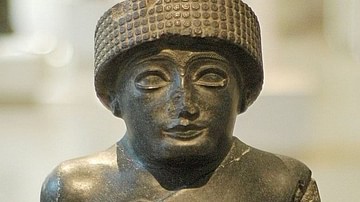
Image
Gudea of Lagash
Seating diorite statue of Gudea, prince of Lagash, dedicated to the god Ningishzida, excavated in Telloh (ancient Girsu), Iraq, dating to the Neo-Sumerian period, c. 2120 BCE.
Louvre, Paris.
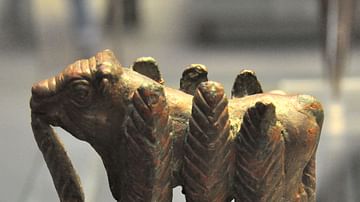
Definition
Nanshe
Nanshe (also known as Nanse, Nazi) is the Sumerian goddess of social justice and divination, whose popularity eventually transcended her original boundaries of southern Mesopotamia toward all points throughout the region in the 3rd millennium...
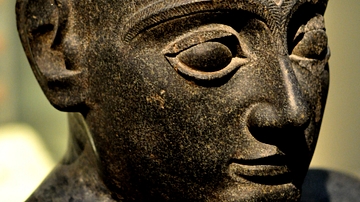
Image
Head of Dolerite Statue of Gudea of Lagash
It is possible that the head and body were not originally part of a single statue. From Girsu (modern Telloh), southern Mesopotamia, Iraq, reign of Gudea, c. 2130 BCE. (The British Museum, London)

Video
Cradles of Civilization - Gudea of Lagash
In part eight of his lecture, Dr. Neiman explains that as the alphabet triumphs, cuneiform fades away. Further, he describes the last great flourishing of Sumerian civilization (Neo-Sumerian period) with the rule of Gudea of Lagash.
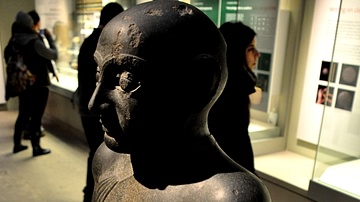
Image
Dolerite Statue of Gudea, ruler of Lagash
Dolerite statue of Gudea, ruler of Lagash. Upper part of standing figure with head; carved and polished mottled green dolerite; but neck restored; represents Gudea, king of Lagash. It is possible that the head and body were not originally...
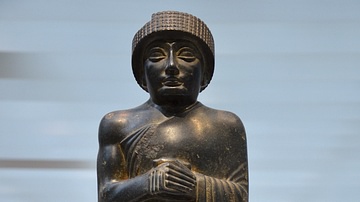
Image
Gudea, Prince of Lagash
Diorite statue of Gudea, prince of the state of Lagash in Southern Mesopotamia who ruled c. 2144–2124 BCE. From Girsu (Irak), around 2120 BCE. Louvre Lens, France.
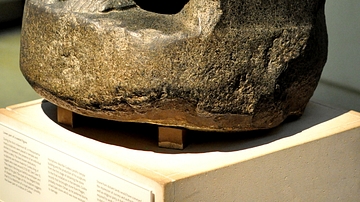
Image
Seated Figure of Gudea
The lower half of this carved and polished granite statue has survived. It probably represents a seated figure of Gudea, ruler of Lagash. Lagash II period, circa 2150 BCE. From Seleucia ad Tigrim (5 miles south-west of Seleucia), Mesopotamia...
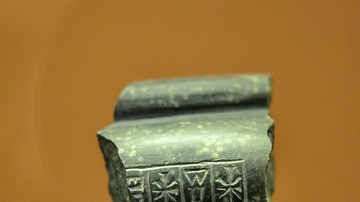
Image
Votive Mace of Gudea
This votive stone mace head was polished and incised with four lines of cuneiform inscriptions. It was a dedication to the god Igalim by Gudea, ruler of Lagash. Lagash II period, c. 2150 BCE. From Lagash, Southern Mesopotamia, modern-day...
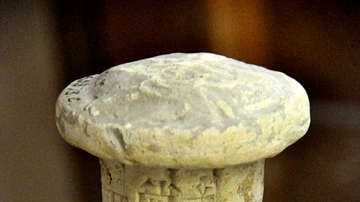
Image
Foundation Cone of Gudea
This foundation cone records the building of a temple at Girsu by Gudea, ruler of Lagash. From Girsu (modern Tell Telloh, Dhi-Qar Governorate, Iraq), Southern Mesopotamia, Iraq. Reign of Gudea, 2144-2124 BCE. (The Sulaimaniya Museum, Iraq...
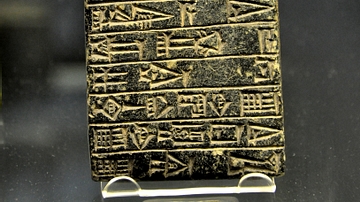
Image
Stone Foundation Tablet of Gudea
This tablet mentions the name of Gudea, ruler of Lagash, to commemorate restoration of the Temple of Nindara. Found below the pavement of the Temple of Nindara at Ur, Southern Mesopotamia, modern-day Iraq. Lagash II period. (The British Museum...